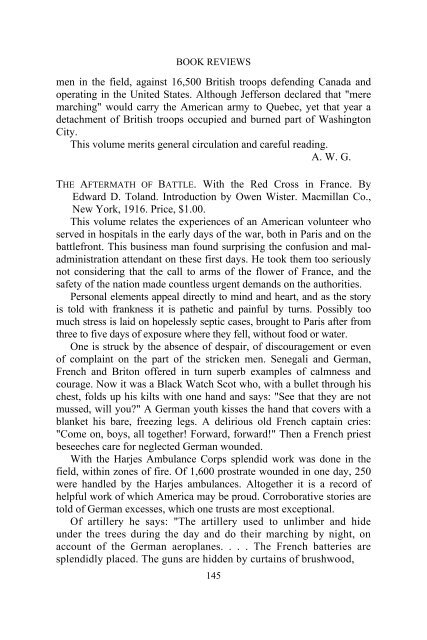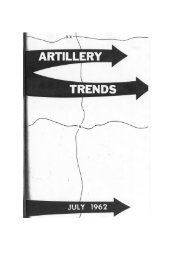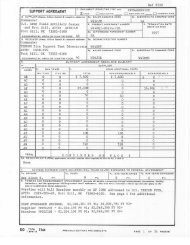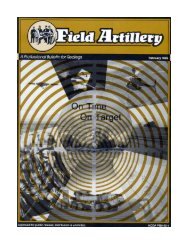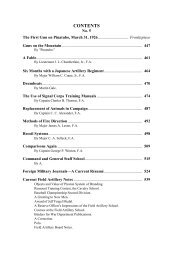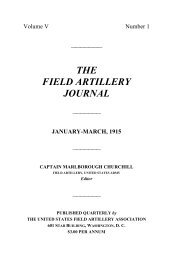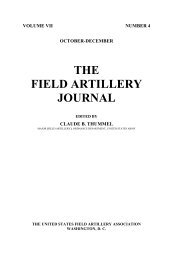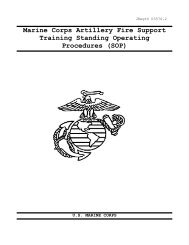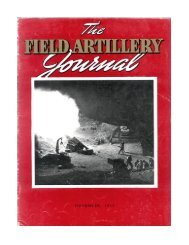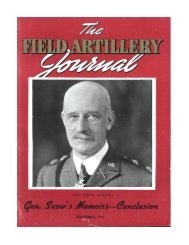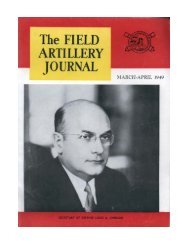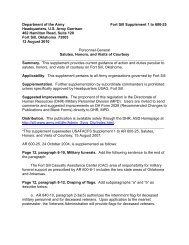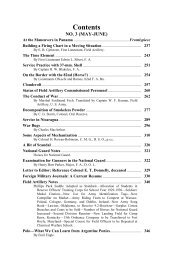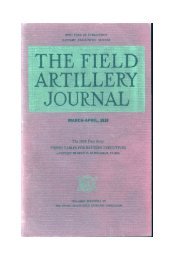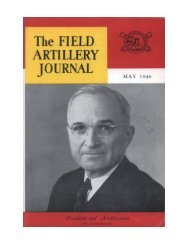the field artillery journal - Fort Sill - U.S. Army
the field artillery journal - Fort Sill - U.S. Army
the field artillery journal - Fort Sill - U.S. Army
You also want an ePaper? Increase the reach of your titles
YUMPU automatically turns print PDFs into web optimized ePapers that Google loves.
BOOK REVIEWS<br />
men in <strong>the</strong> <strong>field</strong>, against 16,500 British troops defending Canada and<br />
operating in <strong>the</strong> United States. Although Jefferson declared that "mere<br />
marching" would carry <strong>the</strong> American army to Quebec, yet that year a<br />
detachment of British troops occupied and burned part of Washington<br />
City.<br />
This volume merits general circulation and careful reading.<br />
A. W. G.<br />
THE AFTERMATH OF BATTLE. With <strong>the</strong> Red Cross in France. By<br />
Edward D. Toland. Introduction by Owen Wister. Macmillan Co.,<br />
New York, 1916. Price, $1.00.<br />
This volume relates <strong>the</strong> experiences of an American volunteer who<br />
served in hospitals in <strong>the</strong> early days of <strong>the</strong> war, both in Paris and on <strong>the</strong><br />
battlefront. This business man found surprising <strong>the</strong> confusion and maladministration<br />
attendant on <strong>the</strong>se first days. He took <strong>the</strong>m too seriously<br />
not considering that <strong>the</strong> call to arms of <strong>the</strong> flower of France, and <strong>the</strong><br />
safety of <strong>the</strong> nation made countless urgent demands on <strong>the</strong> authorities.<br />
Personal elements appeal directly to mind and heart, and as <strong>the</strong> story<br />
is told with frankness it is pa<strong>the</strong>tic and painful by turns. Possibly too<br />
much stress is laid on hopelessly septic cases, brought to Paris after from<br />
three to five days of exposure where <strong>the</strong>y fell, without food or water.<br />
One is struck by <strong>the</strong> absence of despair, of discouragement or even<br />
of complaint on <strong>the</strong> part of <strong>the</strong> stricken men. Senegali and German,<br />
French and Briton offered in turn superb examples of calmness and<br />
courage. Now it was a Black Watch Scot who, with a bullet through his<br />
chest, folds up his kilts with one hand and says: "See that <strong>the</strong>y are not<br />
mussed, will you?" A German youth kisses <strong>the</strong> hand that covers with a<br />
blanket his bare, freezing legs. A delirious old French captain cries:<br />
"Come on, boys, all toge<strong>the</strong>r! Forward, forward!" Then a French priest<br />
beseeches care for neglected German wounded.<br />
With <strong>the</strong> Harjes Ambulance Corps splendid work was done in <strong>the</strong><br />
<strong>field</strong>, within zones of fire. Of 1,600 prostrate wounded in one day, 250<br />
were handled by <strong>the</strong> Harjes ambulances. Altoge<strong>the</strong>r it is a record of<br />
helpful work of which America may be proud. Corroborative stories are<br />
told of German excesses, which one trusts are most exceptional.<br />
Of <strong>artillery</strong> he says: "The <strong>artillery</strong> used to unlimber and hide<br />
under <strong>the</strong> trees during <strong>the</strong> day and do <strong>the</strong>ir marching by night, on<br />
account of <strong>the</strong> German aeroplanes. . . . The French batteries are<br />
splendidly placed. The guns are hidden by curtains of brushwood,<br />
145


